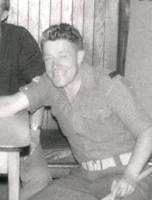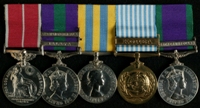
Photograph of Allan by kind permission of Warrant Officer Class 2 (Foreman of Signals) Peter White, Royal Signals (Retired)

(L to R) British Empire Medal (Military Division); General Service Medal 1918-62 with clasps 'Malaya', 'Arabian Peninsula'; Korea Medal; United Nations Korea Medal; General Service Medal 1962-2007 with clasp 'Northern Ireland'
Allan was born on the 15th August 1928 in Dukinfield, which was then in Cheshire. His father was called Ernest and his mother was May. He was the youngest of 4 children; Hannah, Aaron and Ernest were his siblings. Allan's cousin Eric Lees was adopted by the family in 1935 after his parents both died of tuberculosis.
Ernest senior worked at Yew Tree Iron Foundry in Oldham before the Second World War. Allan's sister Hannah died of a brain tumour in May 1937 aged just 16.
There was a strong military tradition in Allan's family. His grandfather Aaron was killed on the 25th February 1918 whilst serving with the 18th Battalion of the Middlesex Regiment.
His father joined the King's Own (Royal Lancaster Regiment) in 1912 and fought in the First World War. He was captured within months and spent 3 1/2 years as a Prisoner of War. In 1939 he re-enlisted to serve in the Second World War. He was discharged in 1942 because of his age.
All 3 of Allan's brothers joined the Army. Ernest, or Ernie, enlisted in March 1941 and served with the 2nd Battalion of the Welch Regiment in Burma. He later fought in the Korean War and saw service in Libya, Cyprus and Nigeria. He was awarded the British Empire Medal to recognise his outstanding service and finally left the Army in April 1978.
After leaving school Allan worked in an iron foundry. He followed in his family's footsteps on the 13th May 1947 when he joined the 42nd (Lancashire) Machine Gun Battalion. He was given the service number 3537454.
This was a Territorial Army (TA) unit based at the Armoury in Ashton-under-Lyne. It had been reformed just 2 weeks earlier. Territorial soldiers lived as civilians and trained during evenings and weekends. They would also attend an annual training camp lasting around 2 weeks. The battalion was under the command of Douglas Glover, whose medals are also in the Museum of the Manchester Regiment collection.
In early 1948 Allan's unit regained its former name, the 9th Battalion of the Manchester Regiment. It also gave up its role as a machine gun battalion. Allan served with it until the 12th July.
Allan had clearly taken to Army life. He left the 9th Battalion in order to join the Regular Army. He enlisted in the Lancastrian Brigade and was given the service number 22231647.
The Lancastrian Brigade was an administrative Group. It included 8 infantry regiments, each of 1 battalion: The King's Own Royal Regiment (Lancaster), The King's Regiment (Liverpool), The Lancashire Fusiliers, The East Lancashire Regiment, The Border Regiment, The South Lancashire Regiment, The Loyal Regiment (North Lancashire) and The Manchester Regiment. Soldiers could be moved between units in their group as needed to keep them up to strength.
Like many soldiers with the surname White, Allan was often known as 'Chalky'. He was first posted to the 1st Battalion of the Manchester Regiment.
This battalion was based in Wuppertal in West Germany from July 1948 until April 1950, when they moved to Berlin. The German capital was surrounded by the Soviet controlled East Germany, and divided into Western and Eastern sectors itself. After a year the battalion returned to the UK, but this was only a short visit. On the 30th May 1951 they set sail for Malaya to join the fight against the communist insurgency there.
As part of this effort the battalion took part in patrols of the jungle and guarded the civilian population in an attempt to restrict the supplies and the freedom of movement available to the insurgents.
We know Allan was serving with A Company of the battalion at Christmas 1951. He was one of the entertainers at the Company concert and party held on Christmas Eve.
By late 1952 Allan had joined the 1st Battalion's Signal Platoon, based in Penang. This unit kept the battalion in contact with other units, mainly by radio. They were an 'all-round sporting Platoon', although 'even the cooks beat us' at football. Allan also had a 'quite pleasant' singing voice, at least until he and 5 of his comrades 'all sang a different song at the same time' during a party!
The King's Regiment (Liverpool) was sent to take part in the Korean War in September 1952. In early 1953 a number of members of the Manchester Regiment were sent to reinforce them. We believe Allan was one of these men. His Korea Medal gives his unit as the Manchester Regiment, rather than the one he served with.
The war in Korea ended in July 1953 and the King's left in October. Allan returned to the Manchesters in Malaya. In May 1954 they left the country and sailed back to the UK. Three months later they returned to Berlin.
During mid 1955 Allan was a newly-promoted Corporal. He had left the Signal Platoon and gone to work in the 1st Battalion's stores.
During 1956 the Battalion left Berlin and returned to West Germany. They were stationed in Minden. The next year they returned to the UK.
On the 1st August 1958, at Brentwood in Essex, the Manchester Regiment was amalgamated with the King's Regiment (Liverpool) to form the King's Regiment (Manchester and Liverpool). Allan continued to serve in the new regiment.
The King's were stationed in Kenya between 1959 and 1961. During this period around half the battalion, including Allan, was sent to Bahrain. This was when Allan was awarded the 'Arabian Peninsula' clasp for the General Service Medal 1918-62. He had to spend 30 days or more in the area before the 30th June 1960.
In June 1961 the battalion was rushed to Kuwait, as Iraq was threatening to invade. They built and manned defences in the heat of the desert for 3 months, until the danger had passed.
The King's returned to the UK in January 1962. Six months later they returned to Berlin. They spent 2 years here before moving to Northern Ireland in 1964. Five years before the Troubles began, this was a peaceful posting.
The battalion was part of the Strategic Reserve, meaning it could be sent anywhere a crisis was brewing. Allan was sent to Libya for a short period in spring 1965, along with A Company. Later that year the whole battalion was sent to British Guiana, where ethnic tensions had led to violence. The Kings helped to keep the situation calm. They carried out similar operations to those Allan had experienced in Malaya.
Allan returned to Northern Ireland in 1966. Two years later he moved to Catterick in Yorkshire and the year after that, 1969, the battalion returned to Minden.
We don't know whether Allan ever left battalion stores after he went to work there in 1955. His work was recognised in October 1969 when he was nominated for the British Empire Medal (BEM). By this time he had been promoted to Sergeant.
Allan was awarded the BEM in the London Gazette of the 13th June 1970. This is his citation:
Apart from a period of illness for four months, Sergeant White has served the twenty one years that he has been in the Army with the battalion. During this period he saw active service both in Malaya and Korea. Through-out the twenty one years he has served loyally and to the very best of his ability. His cheerfulness, sense of loyalty and uncomplaining devotion to duty had gained the respect of all ranks and consequently he has been a steadying influence on many of the young soldiers of the battalion.
In recent years he has been employed in the Quartermaster's Department, where he has been entirely responsible for the clothing shop. He has managed this better than it has ever been before; this has been because he has maintained a single minded devotion to duty which has caused him to work many long hours so that everything is always in excellent order.
He is very keen to continue serving but is unfortunately soon to reach the age limit for his rank. When he leaves the Army in July 1970 he will be greatly missed and it will seem like the end of an era.
When Ernie was awarded his BEM he took 'great delight' in informing Allan by just saying "Snap!"
Although Allan was due to retire in July, circumstances meant that he didn't. The situation in Northern Ireland had become far worse since the King's had left in 1968. Soldiers had first been deployed in August 1969 to help maintain law and order. They had to deal with riots, and over the next few years the threat from violent terrorism only increased.
The King's deployed to Belfast in the autumn of 1970. They spent 4 months in the Province. After this they moved to Berlin, and then Preston in Lancashire. Later in 1971 Allan went on a large exercise to Puerto Rico with the regiment.
The King's returned to Northern Ireland in 1972. Their tour there lasted from the 26th April to the 24th August. This was the most violent and dangerous period of the Troubles; 7 of Allan's comrades were killed and 42 wounded.
This tour was followed by a posting to Hong Kong. Although they had an operational role, there was plenty of time for leave and travel.
Allan left the Army in 1974 after a full career of 22 years. He left as a Sergeant, although he was 'quite a character' and managed to keep this rank 'more by luck than judgement'.
After he left the Army, Allan returned to Ashton. At first he lived with Aaron and his wife Mildred at 48 Furness Avenue on Ashton Moss. He worked as a full-time storeman at the Armoury in Ashton. He later became the building's caretaker and lived at the Armoury. He also joined the Ashton Branch of the Manchester Regiment Old Comrade's Association.
Allan was 'well known around the bars of Ashton. His favourite tipple was whiskey with two fingers of water'. He was always smartly dressed in a collar and tie, 'until he went to live in the Armoury where he reverted to teeshirt and jeans'.
Allan never married. He died from stomach cancer on the 5th April 1986, aged 57. A 'large congregation' attended his funeral at Dukinfield Crematorium, a mark of the respect he was held in.
Allan's medals were donated to the Museum of the Manchester Regiment in October 1987.




